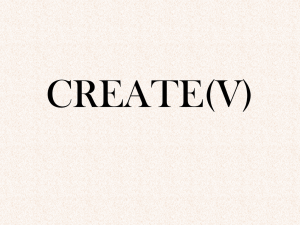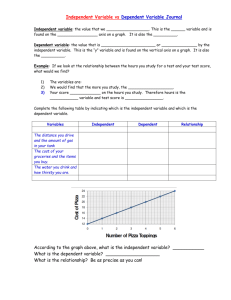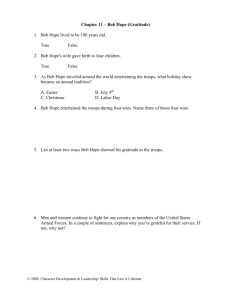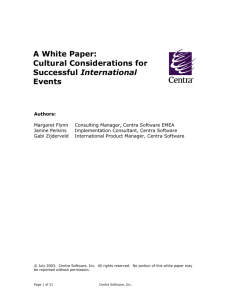CRITICAL THINKING - Critical & Creative Thinking, MA
advertisement
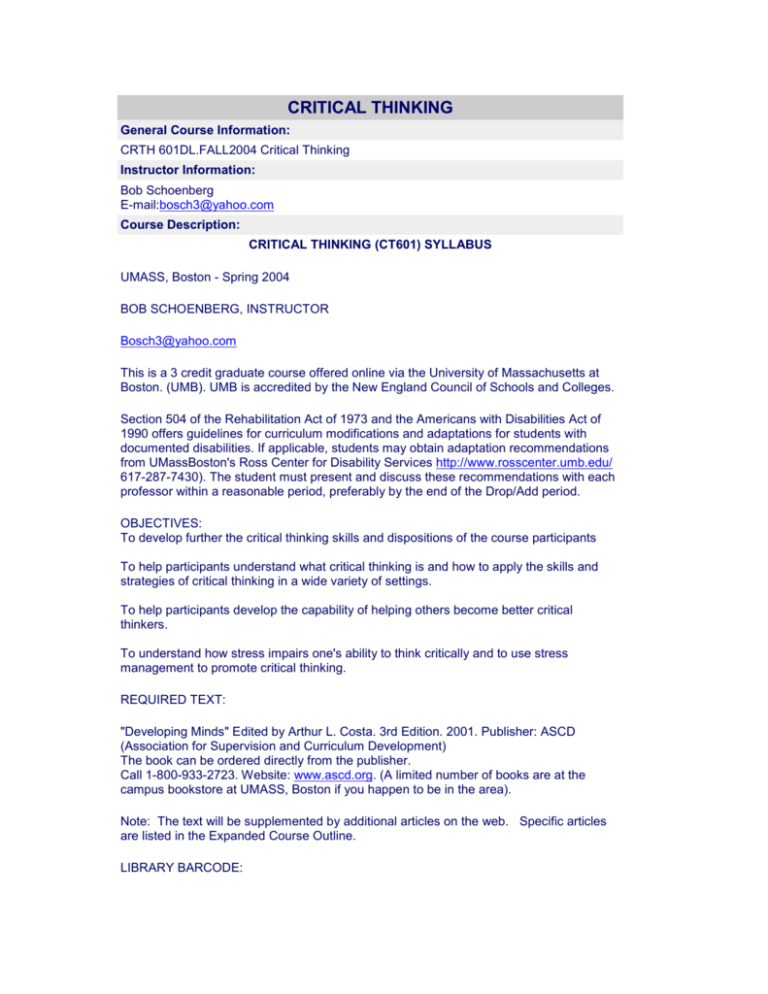
CRITICAL THINKING General Course Information: CRTH 601DL.FALL2004 Critical Thinking Instructor Information: Bob Schoenberg E-mail:bosch3@yahoo.com Course Description: CRITICAL THINKING (CT601) SYLLABUS UMASS, Boston - Spring 2004 BOB SCHOENBERG, INSTRUCTOR Bosch3@yahoo.com This is a 3 credit graduate course offered online via the University of Massachusetts at Boston. (UMB). UMB is accredited by the New England Council of Schools and Colleges. Section 504 of the Rehabilitation Act of 1973 and the Americans with Disabilities Act of 1990 offers guidelines for curriculum modifications and adaptations for students with documented disabilities. If applicable, students may obtain adaptation recommendations from UMassBoston's Ross Center for Disability Services http://www.rosscenter.umb.edu/ 617-287-7430). The student must present and discuss these recommendations with each professor within a reasonable period, preferably by the end of the Drop/Add period. OBJECTIVES: To develop further the critical thinking skills and dispositions of the course participants To help participants understand what critical thinking is and how to apply the skills and strategies of critical thinking in a wide variety of settings. To help participants develop the capability of helping others become better critical thinkers. To understand how stress impairs one's ability to think critically and to use stress management to promote critical thinking. REQUIRED TEXT: "Developing Minds" Edited by Arthur L. Costa. 3rd Edition. 2001. Publisher: ASCD (Association for Supervision and Curriculum Development) The book can be ordered directly from the publisher. Call 1-800-933-2723. Website: www.ascd.org. (A limited number of books are at the campus bookstore at UMASS, Boston if you happen to be in the area). Note: The text will be supplemented by additional articles on the web. Specific articles are listed in the Expanded Course Outline. LIBRARY BARCODE: Some reading assignment will be located in E-reserves at the UMB electronic library. Online students may access the UMB electronic library by means of a barcode. To obtain a barcode an online student must e-mail library.circulation@umb.edu and give: - name as appears at registration -semester and year - course name and number - student ID # -e-mail address The student will receive an e-mail with barcode information. The barcode is good for the semester the student is enrolled in an online UMB course. The barcode enables the online student to: - access e-reserves for his course - access electronic resources (books, articles, journals, etc) - e-mail the library with reference questions COURSE REQUIREMENTS: 30% Participation and homework assignments - Completing class activities and posting to the Message Board (twice per week) 25% Completion of one or two group projects (to be determined by class enrollment size). 20% Two Short Papers - One reflection paper, (about 3-4 typewritten pages) on readings and issues discussed in class and a manifesto (about 3 typewritten pages) synthesizing your view of points about critical thinking that you have found most important . 25% Final Paper or Project (individual) about 10 double-spaced typed pages. This will not be a collaborative effort. (Guidelines for these assignments will be provided). Time Requirements - a regular face to face graduate course in Critical Thinking meets for 2 1/2 hours a week and requires at least 5 additional hours a week of reading and writing outside of class. Plan on spending at least that amount of time for this class. A Typical Class - Each week there will be a new class posted. The "class" will consist of some statement(s) written by me usually focusing on a specific topic or theme and will have some activities and assignments for you to do. Much of the learning that will take place will be among each other as you will be working and collaborating with other participants in the class. You will need to check into the classroom once a week and Post on the Message Board twice a week. Much more time will be spent communicating and collaborating with other participants in the course, particularly in regards to projects. You can check into the classroom and post messages any time of the day or night. COLLABORATIVE NATURE: This course is based upon collaborative learning. This means that you will be working together with other participants in this class. Using various technologies, including chat, message boards, email and collaborative files, you will actually have more contact with other participants in this class than you would in a regular face to face class. Much of the learning that will take place will occur as you collaborate and work with each other. My role is more of a facilitator, providing the structure and learning activities. As we embark upon this exciting endeavor in Distance Learning, I suspect that we will all learn from each other, myself included. To encourage collaboration, each participant in the class will select a "buddy" about the second week of the course. You will be expected to contact each other once a week using either email, chat or even Instant Messaging, if you prefer. This is one of several ways that we will develop a sense of community and connection to each other. ADDITIONAL REQUIREMENTS: All participants must have experience using the Internet and know some basic word processing skills. In addition, you will need to become familiar with Prometheus - the software we use to run this course. Tutorials and a student handbook are available.. Go to http://www.lms.umb.edu. for more information. Technical Specifications All proprietary browsers including the AOL browser and MSN Explorer browser are not supported. Supported Operating Systems, Browser and Browser Settings A 56k Internet Service Provider (ISP) is the 'minimum' recommended for connection optimization. A Pentium III PC or G3 MAC with 256k memory is the minimum recommended. (Lesser systems may be able to access the system, but certain course features may be impaired.) Downloads Shockwave Player This free software is required to utilize Chat http://www.macromedia.com/software/shockwaveplayer Real Player This software may be required to view streaming media. Look for the free ‘FREE Real Player’ link. http://www.real.com/realone Adobe Acrobat Reader Some course files may also require Adobe Acrobat Reader-(.PDF format) http://www.adobe.com Microsoft Office Viewers Users that do not have MS Office installed on their machines will need to download MSWord Viewer (.DOC format), MSPowerPoint Viewer, MS Excel Viewer. (Look for free Microsoft Viewers) http://www.microsoft.com/downloads QUESTIONS? CONTACTS: For more technical information or Tech Support email: bostonsupport@umb.edu Registration Questions? Contact Kitty Galaitsis. Telephone 617-287-7910 or email katherine.galaitsis@umb.edu. Academic Questions? Contact your instructor - Bob Schoenberg. bosch3@yahoo.com GRADES & EVLAUATION: The criteria used to evaluate your papers and projects will be contained in the guidlines which be provided to you. Written papers and other assignments turned in on time will automatically be given a grade of B+, unless the assignment is really below par. Assignments which are not of this minimal standard will be returned to you as a "redo". If you "redo" the assignment, you will be guaranteed a higher grade on that assignment, but not necessarily an "A". If you choose not to do the assignment again, the current grade will stand. For example, if you receive the grade of a "B" and do not do the assignment again as a "redo", you will receive the grade of a "B" for that assignment. Sometimes you will be given an opportunity to revise and resubmit an assignment. This doesn’t mean that your work is unacceptable or that you did anything wrong (as in the case of a "redo"). It is an opportunity to do more in-depth, critical thinking . If you revise and resubmit, it will assure you of a higher grade. However, the emphasis must be on learning. This is a graduate course and it is expected that your work will be at least worthy of a B+. To earn a higher grade than a B+, you will need to revise and resubmit some assignments. You will not have the option to revise or redo the final paper/project. Additional information about the grading system and the use of the grading criteria will be provided in class. Extra Credit - an optional extra credit assignment may be done with the instructor's approval. AVAILABILITY of INSTRUCTOR: I do not keep "virtual office hours". You can email me anytime of the day or night. However, I am NOT available on a 24 hour, 7 days a week basis. Usually, you can expect a reply to your email within 24 hours or less. If you have a general question, you should post it on the MESSAGE BOARD. Otherwise, please do email me. I check my email, regularly and frequently. However, please be advised that I take one day off a week. From Friday evening until Saturday evening, I do not use my computer or check email. So, if you write to me late Friday afternoon, it's possible I won't respond to your message until Sat. night or even Sunday. Rather than offer specific office hours, I prefer to work by appointments, realizing that many of you are busy during the day. I am quite flexible and can often schedule evening and weekend appointments.(Appointments can consist of the use of the chatroom, Centra or even Yahoo Messenger). In addition to scheduled appointments and email, I will be hosting some chatroom discussions, where anyone in the class will be able to "chat" with me - exact time to be announced. You'll actually have more access to talk with me than you would in a regular face-to-face classroom where instructors usually keep office hours during the day. If you have an urgent problem or some type of an emergency, you can call me. However, such a phone call should really be reserved for an urgent matter or an emergency situation. For technical problems, always contact Technical Support at: bostonsupport@umb.edu Conferences - I plan to have a conference with each of you at least once during the semester. This will probably take place in a restricted chat room or possibly with "live voice communication". You will need a microphone and need to download and test some software (Centra) before we do this. The software is free. You may also use Yahoo Messenger. Town Meeting - at least once or twice a semester, we will all get on line at the same time and using Centra software (which is free), we will be able to talk to each other live, via a microphone and headset hooked up to your computer. If you have a web camera (optional), we will be able to see each other as well. (You will need to purchase a microphone and a headset to participate in this town meeting unless you already have such equipment). Please note that our first "Town Meeting" using CENTRA software will take place during the 3rd week of classes. COMPONENTS of COURSE: Message Boards - You can post a message or respond to one. This is a threaded discussion. Whatever you say should reflect critical thinking. Use of Message Boards is restricted to academic topics. "Flaming" or verbally attacking someone, is not allowed. While you certainly can disagree with someone, if you wish to have a personal discussion with someone, take it off line and either use email or the phone. Note that the Messages you post will be archived (saved). Chat - Unlike the Message Board where you post a message, chat allows you to instantly type something and immediately, everyone in the chatroom will see your message and can instantly respond to it. Certain Chatroom discussions will be archived (saved). Project Area - this is where various projects, papers and other completed assignments will be posted for the entire class to see. Email is the primary way that we will communicate with each other. It is essential that we have each other's email addresses and that they are correct. There may be other areas of the website made available for your use. In addition, you will be able to create your own personal website as well. Secured Website - Access to the Prometheus Website - the website that will actually house our class is restricted. Only people who are authorized and have a proper password will be allowed to enter. Students in other online classes will NOT have access to this site. The general public can NOT access this site, either. So, there is a degree of confidentiality. It may be necessary to make some modifications to this syllabus as it is not possible to anticipate every situation that might arise. Distance Education, using a collaborative model, is an exciting new development in education, especially with the technology we have available. I look forward to learning and working with you in what I consider to be a new frontier in education. Bob Schoenberg About Bob Schoenberg Bob Schoenberg is a graduate of the Critical & Creative Thinking Program at UMASS. Boston and has a Master of Arts degree in Critical & Creative Thinking. He also has a Bachelors Degree in Music Education from the Hartt College of Music, University of Hartford and a Training Certificate in Human Behavior from the Change Agents Training Institute, Hartford, CT Mr. Schoenberg has taught Critical Thinking at Mass Bay Community College in Wellesley, MA. He has developed and created this online version of Critical Thinking based upon the regular face to face course in Critical Thinking. Bob has also taught Critical Thinking at Regis College and for the Massachusetts Teachers Association (MTA) where he has presented several workshops. Other Teaching Assignments include: Fairfield University, Fairfield, CT. where he created and taught two graduate courses: "Classroom Discipline Management" and "Theory and Practical Application of Stress Management". Mr. Schoenberg was the first to combine Critical Thinking with Stress Management and wrote his Masters Thesis (Using Stress Management to Promote Critical Thinking) on the premise that one can not think critically if one is stressed, He has over 20 years experience in the area of stress management and stress reduction. For further information, contact Bob at Bosch3@yahoo.com When he is not teaching or researching, Bob enjoys dancing, walking email, learning more about computers. He is an avid ballroom dancer and hopes someday to become a dance instructor. Bob recently moved from the Boston area to Cranston, RI. Condensed Course Outline: This is a condensed outline of the course. For more details click on the OUTLINE menu within Prometheus. (This feature is only available to registered students of this course). There are 13 class sessions. Session 1 Introductions and Orientation Session 2 What is Critical Thinking? History and Definitions BEGIN PROJECT #1 Session 3 Developing Critical Thinking CENTRA SESSION this week! Session 4 Some Critical Thinking Skills – Metacognition and Frame of Reference Session 5 Stress and Critical Thinking Session 6 Stress Management & Critical Thinking, Empathy Session 7 Strong Sense Critical Thinking and Infusion Session 8 Methodological Believing PROJECT Due Session 9 Causal Reasoning. Pedagogical Construction BEGIN Paper #1 Session 10 Problem Based Learning, Critical Thinking and Content Knowledge OUTLINE for FINAL PROJECT/PAPERDUE Paper #1 due. Session 11 Transfer & Critical Thinking in Education, Business and Other Professions PROJECT #2 Due. BEGIN REFLECTION PAPER Session 12 Critical & Creative Thinking REFLECTION PAPER DUE Session 13 Assessment. Evaluation of Course. Next Step? FINAL PROJECT DUE within one week. Welcome Video: Welcome Message Info -Click on this link: http://rstream.umassonline.net:8080/ramgen/boston/GCOE/CRCRTH601/SchoenbergCRCRTH601-intro.rm To view this file you need to have the free Real Player Basic installed on your computer RealOne Player (Hint: "Download the FREE RealOne Player in the upper right corner, NOT the 14 Day Trial".)


